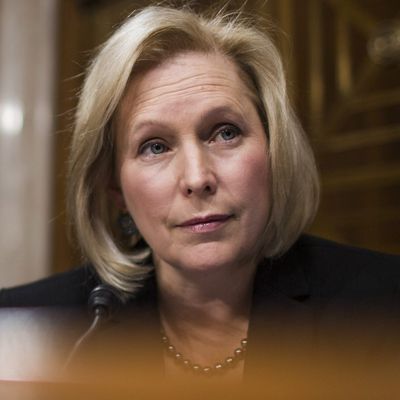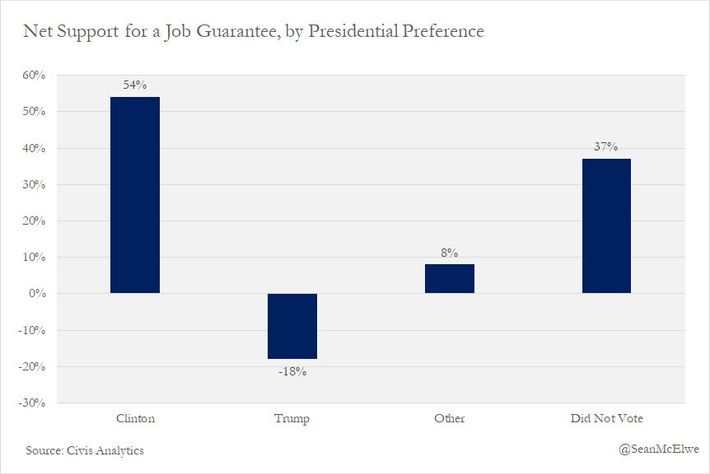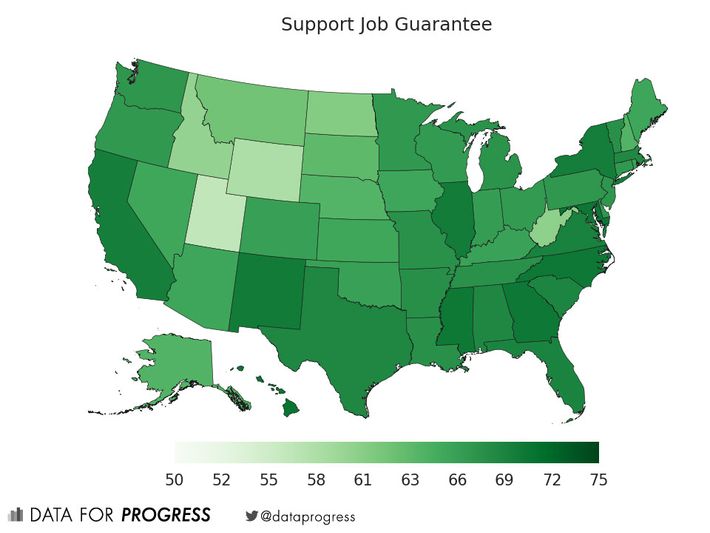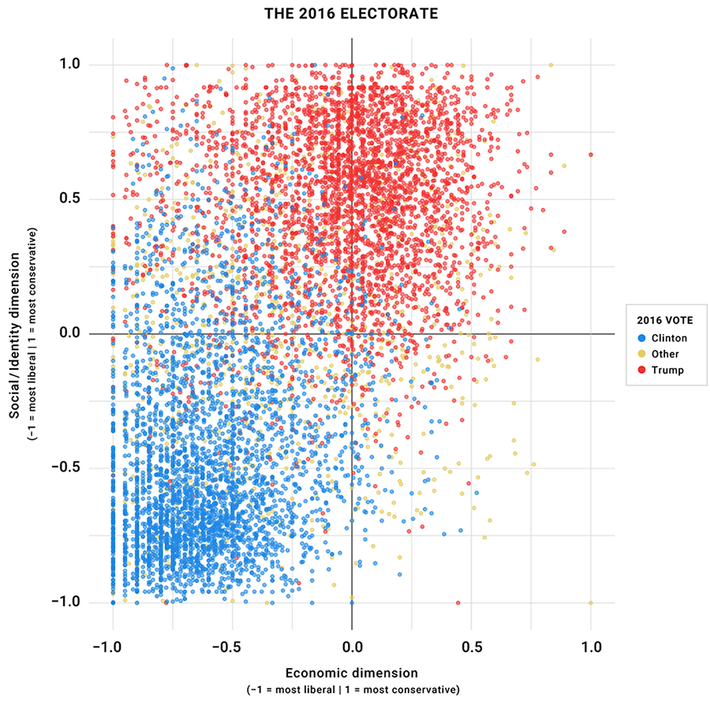
Last week, a self-styled moderate Democrat won a congressional race in the heart of Trump Country — and the last-surviving “Blue Dogs” promptly declared their vindication. For the Democrats’ right flank, Politico wrote, “Lamb’s successful center-left campaign is proof that the Democratic Party’s ‘big tent’ mentality is still a winning electoral strategy, despite an aggressive push from liberals for candidates that more closely adhere to the progressive purity made popular by the likes of Sens. Bernie Sanders (I-Vt.) and Elizabeth Warren (D-Mass.).”
This analysis is at once banally true and insidiously misleading. There is no question that the Democratic Party would be unwise to trumpet the exact same message in Greensburg, Pennsylvania, as it does in Berkeley, California. And during his successful campaign in the former, Conor Lamb did hit culturally conservative notes on gun control and Nancy Pelosi, while saying as few words as he could get away with about immigration and Donald Trump. And yet, the suggestion that Lamb’s win exposed the folly of “progressive purity” — as preached by Bernie Sanders and Elizabeth Warren — is an odd one.
After all, those senators aren’t known as “purists” for their hard-line positions on gun control, or effusive support for the House Minority Leader. In fact, Sanders’s record on firearms and immigration includes stances about as conservative as those that Lamb just championed in southwest Pennsylvania. The reason why Sanders can nonetheless serve as a synonym for left-wing purity is precisely because the most salient divides in today’s Democratic Party do not lie on “culture war” issues, but rather, on economic ones — which is to say, on those issues where Conor Lamb strayed least from progressive orthodoxy.
There is a lot at stake in these distinctions. The Democratic Party’s corporate wing has a vested interest in the idea that moderation on issues of regulation and redistribution is an electoral necessity in pro-Trump regions. Just last week, business-friendly Democrats helped Mitch McConnell make it easier for banks to discriminate against black people and evade regulatory scrutiny — and justified their complicity (in anonymous quotes to the press) on grounds of political expediency: To get reelected in red and purple areas, Democrats needed to prove their “bipartisan” bona fides.
But there is little evidence that Democrats have any political incentive to broadcast their sympathy for Wall Street, or to demonstrate their sensitivity to corporate interests. In fact, there isn’t even much basis for believing that running competitive campaigns in pro-Trump districts and championing far-left economic policies are incompatible objectives. On the contrary, there’s actually some reason to think that Democratic candidates would have an easier time making inroads in Red America, if they ran on the right kind of radical fiscal policy — like, for example, a federal jobs guarantee.
The idea that the federal government should serve as an employer of last resort — by guaranteeing a public job to any American unable to find work in the private sector — has a long history on the Democratic left. In the 1930s, the populist demagogue Huey Long popularized the concept as part of his Share Our Wealth plan — a far-left alternative to Franklin Roosevelt’s New Deal. Three decades later, Martin Luther King Jr. called on the government to provide either guaranteed jobs — or a guaranteed basic income — to all unemployed Americans. And in the late 1970s, as U.S. workers suffered from the unholy combination of high unemployment and runaway inflation, the idea nearly made its way into law. But the proposal proved to be too left-wing for the Carter administration, and the Reagan Revolution banished it from the realm of “reasonable” debate — until New York senator (and presumptive 2020 presidential candidate) Kirsten Gillibrand announced her support for the policy this week.
It isn’t hard to see why the federal jobs guarantee has spent so many decades in the wilderness: It is a genuinely radical proposal. In setting a minimum standard for wages, benefits, and hours — and giving every private sector worker the option to walk off the job without suffering unemployment — it’s a policy with the potential to drastically shift the balance of power between capital and labor. And given the scale of government intervention in the economy that it implies, it’s at least as “left-wing” as anything in Bernie Sanders’s 2016 platform; in fact, a jobs guarantee was ostensibly too radical of an idea for America’s favorite democratic socialist two years ago.
Thus, if American politics works as Blue Dog Democrats often suggest — if swing voters have coherent ideological views, and move back and forth between the two major parties because their policy preferences (on economic and “identity” issues) lie near the center of a left-right axis — then support for a federal jobs guarantee should be minuscule at the national level, and virtually nonexistent in Red America.
But new survey data from the progressive think tank Data for Progress (DFP) demonstrates the very opposite. Now, when an ideologically motivated think tank puts out a poll showing that the public supports a policy it endorses, one should generally take its findings with a bucket of salt; in most cases, you’ll find that the survey was strategically worded to yield the desired result. But as DFP co-founder Sean McElwee explains in the Nation, the think tank took pains to preempt that criticism:
To explore the possibility of Democrats’ running on a guaranteed-job plan, we asked the respected data analytics firm Civis Analytics to not only poll guaranteed jobs, but poll it in the way that would be most likely to gain opposition from voters. They asked respondents: “Democrats in Congress are proposing a bill which would guarantee a job to every American adult, with the government providing jobs for people who can’t find employment in the private sector. This would be paid for by a 5 percent income tax increase on those making over $200,000 per year. Would you be for or against this policy?”
… The results of the Civis polling were nothing short of stunning, showing large net support for a job guarantee: 52 percent in support, 29 percent opposed, and the rest don’t know. “Even with explicit partisan framing and the inclusion of revenue in the wording, this is one of the most popular issues we’ve ever polled,” said David Shor, a senior data scientist at Civis Analytics.

These results are broadly consistent with previous polling on a jobs guarantee (in 2014, YouGov found a plurality of Americans backing the idea of “a law guaranteeing a job to every American adult, with the government providing jobs for people who can’t find employment in the private sector”). What makes DFP’s research revelatory is that it includes an estimate of the policy’s viability on a state-by-state basis. Using demographic data from a separate jobs-guarantee poll conducted by the Center for American Progress, the think tank modeled state-level support for the concept — and found that “guaranteed jobs” is one of the least regionally divisive ideas in American politics.
“The urban-rural divide in support for the job guarantee is practically nonexistent,” Colin McAuliffe, a co-founder of Data for Progress, told New York, in an email. “We estimate 69% support in urban zip codes vs 67% in rural ones. On the other hand, for $15 minimum wage we estimate 69% support in urban zip codes and 49% support in rural zip codes.”

Now, these findings come with a small caveat: The CAP poll from which they derive did not include any mention of “Democrats” or tax increases. But it did describe a massive expansion of “big government,” asking voters if they agreed that “for anyone who is unemployed or underemployed, the government should guarantee them a job with a decent wage doing work that local communities need, such as rebuilding roads, bridges, and schools or working as teachers, home health-care aides, or child-care providers” — and roughly two-thirds of rural America said yes.
This shouldn’t be surprising. Decades of political research has established that most voters view politics through the lens of identity, not ideology. Ordinary voters do not cast their ballots for whichever party or candidate most faithfully represents their abstract political philosophy, but rather, whichever one appears to best represent their people — a group they may define with reference to class, region, religion, gender, race, or partisanship itself.
Thus, when the typical “conservative” working-class voter hears a description of the federal jobs guarantee, she does not plot the proposal’s ideological valence on the left-right spatial model she keeps in her head (or ask herself what Friedrich Hayek would think); she merely hears a common-sense idea for giving work to the idle, and providing employment security to working-class people like herself.
And this is part of what makes the idea that Democrats must campaign as economic moderates in working class, pro-Trump districts so misguided. Reachable voters in such areas are almost invariably cross-pressured: Their racial or cultural identities pull them toward the GOP, while their class consciousness (however dim) makes them more sympathetic to “liberal” economic ideas. Such culturally conservative, fiscally progressive voters constitute a hefty chunk of the American electorate: A recent study of voter opinion by the political scientist Larry Bartels found that about one-fourth of Hillary Clinton’s supporters espoused downright Trumpian views on “cultural” issues, while still endorsing (and, ostensibly, prioritizing) conventionally liberal convictions about the role of government in the economy. Meanwhile, Bartels found that a majority of Republican voters approved of “government efforts to regulate pollution, provide a decent standard of living for people unable to work, and ensure access to good health care, while substantial minorities favor reducing income differences and helping families pay for child care and college.”
This study, along with multiple others, testifies to a basic truth about American politics, circa 2018: If Democrats could only get voters to cast their ballots on the basis of their views on economic policy, they would dominate all levels of government.

But the party will make little progress toward that objective so long as it instructs its candidates in blue-collar, rural districts to disavow any policies that draw too sharp a contrast with Paul Ryan’s agenda.
In reality, there’s reason to suspect that bold, easy-to-understand progressive policies like a jobs guarantee might actually make Democrats more competitive in such places, by increasing the electoral salience of class identity. In the Data for Progress poll, Republicans who earned less than $25,000 a year were more supportive of a jobs guarantee than Democrats who made over $150,000.
None of this is to suggest that every progressive economic policy is a political winner in every district in the United States. Conor Lamb’s reluctance to endorse a $15 minimum wage in rural Pennsylvania was not wholly irrational; given the median income in that part of the country, it’s likely that the $15 figure strikes some of his constituents as too high (although Lamb could have explained that the new wage floor would be phased in gradually). The point is simply that, contrary to conventional wisdom, there is no ironclad relationship between how politically pragmatic a given policy idea is, and how far “left” it would fall on an ideological scale.
A jobs guarantee is radical in theoretical terms, but has a strong claim to common sense in political ones: The idea that the government has a responsibility to provide opportunities for gainful employment to all its constituents is thoroughly bipartisan. Any speech about economic policy — from any candidate from either party — affirms this premise. There’s no (official) disagreement about the goal of maximizing employment in American politics; only about the means through which to do so. Republicans insist that reducing taxes on the wealthy and regulations on corporations is the silver bullet; Democrats have generally told a more complicated story involving education, innovation, diversity, and redistribution.
A federal jobs guarantee offers Team Blue a prescription for how the government can increase employment opportunities that’s just as simple as the GOP’s, but far more intuitive — namely, “directly hire all of the unemployed people.” And once one stipulates that American voters do not actually have any implacable hostility to “big government,” it becomes obvious that this pitch should be an easier sell than the GOP’s “give yet another tax break to the rich.”
For this reason, it’s heartening that top Democratic think tanks are hashing out detailed versions of the policy, and that top Democratic presidential hopefuls like Kirsten Gillibrand are embracing it.
Pragmatic, moderate Democrats — who wish to expand the borders of “Blue America” this fall — would do well to follow her lead.






























